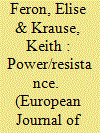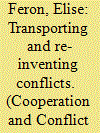|
|
|
Sort Order |
|
|
|
Items / Page
|
|
|
|
|
|
|
| Srl | Item |
| 1 |
ID:
187149


|
|
|
|
|
| Summary/Abstract |
Peacebuilding policies and practices represent strong attempts by external actors to exercise power in postconflict settings. Yet the extensive theoretical treatments of power in International Relations remain somewhat disconnected from empirical analyses of peacebuilding, and how external actors exercise power is under-conceptualised in the literature. Likewise, the literature on forms of resistance by local actors is seldom examined as an exercise of power in itself, and as part of a multidimensional relationship of power/resistance between external and local actors. This article thus theorises the different dimensions of power/resistance, with a detailed focus on an exemplary case – international efforts at peacebuilding in Burundi – that spans more than twenty years. It deploys a tripartite conception of both to analyse the ways in which different forms of power and resistance can be uncovered in peacebuilding practices, We demonstrate this via an analysis of postconflict peacebuilding in Burundi, and in particular the longer-term efforts of local actors to overtly and covertly bend and fuse peacebuilding practices to their own ends.
|
|
|
|
|
|
|
|
|
|
|
|
|
|
|
|
| 2 |
ID:
154733


|
|
|
|
|
| Summary/Abstract |
Like other types of diaspora groups, conflict-generated diasporas display a strong attachment to their countries of origin, and structure their identities and ideologies around discourses referring to their homeland. However, their inner cleavages, born out of the conflicts raging in their home countries, can run very deep. The maintenance of their ethnic, religious, linguistic or political divisions even generations after the migration process has taken place sometimes leads to conflict transportation processes, whereby the conflicts raging in their home countries are reproduced and maintained in countries of settlement. Incidents opposing rival diaspora groups are thus often interpreted as a prolongation or reproduction of core conflicts raging in their regions of origin. Against this assumption, this article argues that if transported conflicts often formally take the shape of core conflicts, and emulate them by using the same language, symbols and ethnic/religious/linguistic categories, they are also deeply transformed by the migration process itself. In this perspective, this article explores the transformation and reinvention of conflict-generated diasporas’ politics, and proposes to look at the autonomisation processes they display vis-à-vis the core conflicts, in terms of content but also of objectives, ultimately generating a drift at the political and organisational levels.
|
|
|
|
|
|
|
|
|
|
|
|
|
|
|
|
|
|
|
|
|